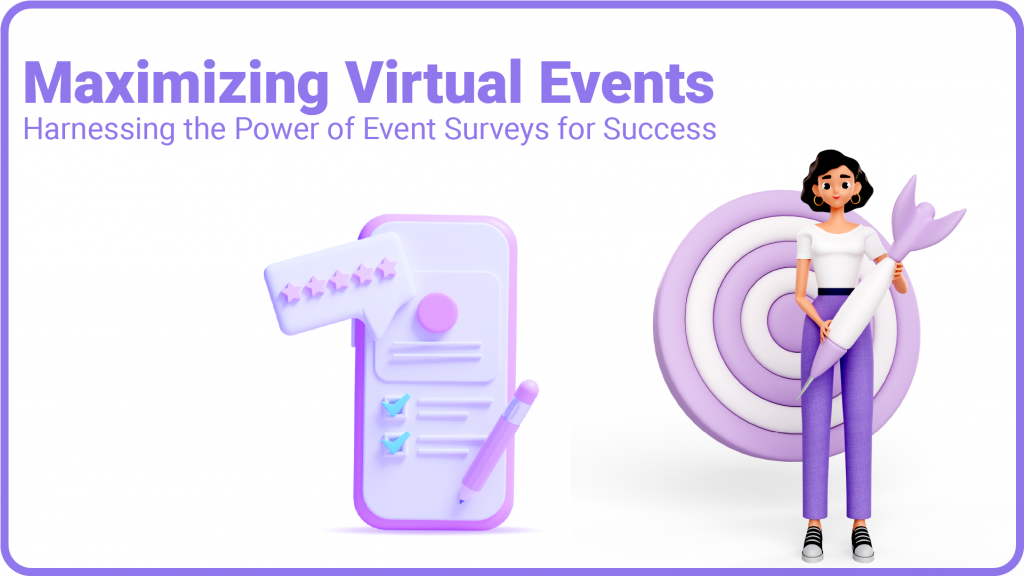
Maximizing Virtual Events: Enhancing Engagement and Gathering Insights with Event Surveys
Event planners encounter distinct obstacles when it comes to captivating participants, collecting feedback, and evaluating the overall triumph of their endeavours. An indispensable resource for accomplishing these goals is the event survey.
Capturing event surveys during virtual events offers numerous benefits for event planners. Some of these benefits include:
Capturing Attendee Feedback: Virtual events provide an excellent opportunity to gather feedback from attendees regarding their experiences. Event surveys allow organizers to collect valuable insights on various aspects, such as the event content, presentation quality, speaker effectiveness, and overall satisfaction. These responses can provide organizers with a comprehensive understanding of what worked well and areas that need improvement.
Enhancing Attendee Engagement: It is a critical factor in the success of any virtual event. Event surveys can be strategically used to boost attendee engagement during and after the event. By incorporating interactive elements within the survey, such as quizzes, polls, or open-ended questions, organizers can encourage attendees to actively participate and share their thoughts. This involvement not only improves engagement but also enhances the overall attendee experience.
Measuring Event Success: Virtual events require careful evaluation to determine their success and identify areas for improvement. Event surveys provide organizers with measurable data to assess key performance indicators (KPIs) such as attendance rate, satisfaction rate, content relevance, networking opportunities, and overall event impact. By analyzing these metrics, organizers can gauge the event’s effectiveness and make data-driven decisions for future iterations.
Tailoring Future Events: One of the most significant advantages of conducting event surveys is the ability to gather attendee feedback on what worked and what didn’t for the event. Planners can keep these points in mind while planning the next events.
Popular Tools for Capturing Event Surveys: There are several other online survey tools similar to that can be used to capture event feedback. Some popular alternatives include:
1. Google Forms: Google Forms is a free survey tool provided by Google. It offers a straightforward interface, various question types, and easy sharing options. Responses are automatically collected in a Google Sheets spreadsheet for analysis.
2. Typeform: It is known for its visually appealing and interactive survey designs. It provides a user-friendly interface, customizable templates, and advanced features like logic branching and conditional questions.
3. Qualtrics: A comprehensive survey platform suitable for more advanced research and feedback collection. It offers a wide range of question types, survey logic, advanced reporting options, and integrations with other software systems.
4. SurveyGizmo: SurveyGizmo is a flexible survey tool that allows for creating complex surveys with advanced features such as skip logic, piping, and custom scripting. It offers various reporting options, data analysis tools, and integrations with third-party applications.
5. Zoho Survey: Part of the Zoho suite of business software tools. It provides a simple interface, customization options, and features like question branching, multilingual surveys, and real-time reporting.
6. Microsoft Form: A free survey tool, it is available for Microsoft users. It offers a straightforward interface, customizable templates, and options to collaborate and share surveys with others.
7. SurveyMonkey: It is a widely recognized and popular online survey tool that allows event planners to capture event feedback efficiently. It offers a range of features and functionalities tailored to meet the needs of collecting feedback from event attendees
Each of these survey tools has its own unique features, pricing plans, and integrations. Event planners can choose the one that best fits their specific requirements and budget to effectively capture event feedback.
Ensuring Data Security When Capturing Attendee Surveys
When capturing event survey data, it’s essential to prioritize the protection of attendee data. Here are some best practices to follow
Use secure survey tools: Choose a reputable survey tool that prioritizes data security and has robust measures in place to protect attendee data. Look for tools that offer features like data encryption, secure transmission protocols, and compliance with relevant data protection regulations.
Anonymize data whenever possible: If feasible and appropriate for your survey objectives, consider anonymizing the data you collect. Remove any personally identifiable information (PII) from survey responses to minimize the risk of data breaches or unauthorized access.
Obtain informed consent: Clearly communicate the purpose of the survey and obtain explicit consent from attendees before collecting their data. Clearly outline how the data will be used, stored, and protected. Ensure attendees have the option to opt out or withdraw their consent at any time.
Limit data collection to what is necessary: Collect only the data that is necessary for the purpose of the survey. Avoid collecting sensitive personal information unless it is directly relevant to the survey objectives. Minimize the amount of personally identifiable information collected to reduce the potential impact of a data breach.
Implement access controls: Restrict access to survey data to only authorized individuals who require it for analysis or event planning purposes. Implement user roles and permissions to ensure that only authorized personnel can access, view, or manipulate the data.
Regularly update and patch survey tools: Keep your survey tools up to date with the latest security patches and updates. This helps protect against known vulnerabilities and ensures that your survey tool maintains a high level of security.
Data encryption and secure storage: If you store survey data, use encryption to protect it from unauthorized access. Implement secure storage solutions, such as encrypted databases or cloud storage with appropriate access controls, to safeguard the data from breaches.
Train staff on data protection: Educate and train your event staff on data protection best practices, including the importance of handling attendee data with care, recognizing potential risks, and adhering to security protocols.
Regularly review and audit data practices: Conduct regular reviews and audits of your data collection, storage, and handling practices to ensure compliance with privacy regulations and identify any areas that may need improvement.
By following these best practices, one can help ensure the protection and privacy of attendee data while capturing event survey responses.
Capturing Attendee Feedback on HuddleXR
The best thing about HuddleXR, Online Virtual Event Platform is that you can use almost any survey tool to capture event survey. Event planners can decide how and where they want to capture the attendee feedback. The best part is that.
Embedding a survey link: Create your survey using any of these tools and generate a shareable link for the survey. In the HuddleXR platform, find the appropriate section or module where you want to include the survey. Use the embedding options provided to embed the survey link directly into the module or section.
Integrating APIs: HuddleXR also provides integration capabilities via APIs, you can leverage API of your preferred survey tool to integrate the survey directly into the platform. This will require technical knowledge or assistance from a developer to establish the integration using the available API documentation and guidelines.
Final words
In conclusion, event surveys play a crucial role in the success of virtual events. They allow organizers to capture valuable feedback from attendees, enhance engagement, measure event success, and tailor future events based on the gathered insights.






